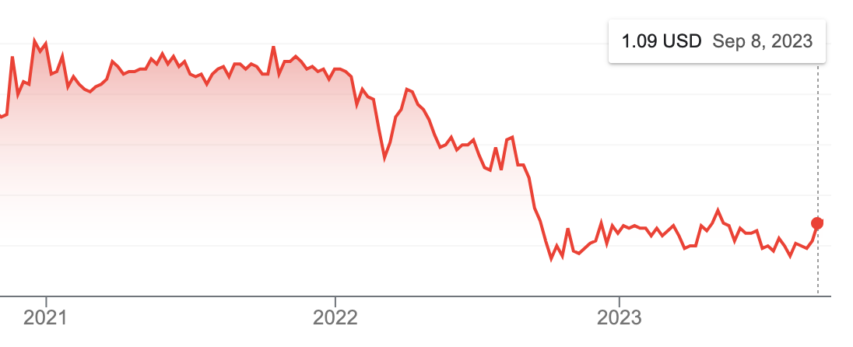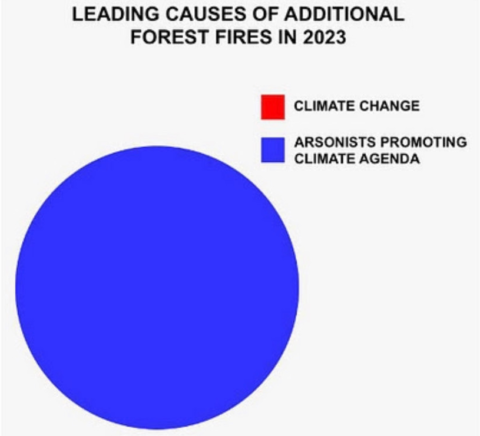The same people who last week were screeching about the government having concentration camps now want me to give my AR15s to that same government.
The same people who last month were hyperventilating about the government slaughtering black people now expect me to surrender my guns to that same government.
The same people who last year were setting stuff on fire and yipping about the government rounding up the gays and Muslims for liquidation now think it’s a good idea for me to just hand over my rifles to that same government.
You chuckleheads need to make up your damned minds.
Lawdog, “You know what I find …”, The Lawdog Files, 2019-08-07.
September 19, 2023
QotD: Logical consistency isn’t their jam
September 18, 2023
It turns out that buying up the rights to old rock songs wasn’t a good investment after all
Ted Gioia enjoys a little bit of schadenfreude here because he was highly skeptical of the investments in the first place, although the geriatric rockers who “sold out” seem to have generally made out like bandits this time around:
Back in 2021, investors spent more than $5 billion buying the rights to old songs. Never before in history had musicians over the age of 75 received such big paydays.
I watched in amazement as artists who would never sell out actually sold out. And they made this the sale of a lifetime, like a WalMart in El Paso on Black Friday.
Bob Dylan sold out his entire song catalog ($400 million — ka-ching!). Paul Simon sold out ($250 million). Neil Young sold out ($150 million). Stevie Nicks sold out ($100 million). Dozens of others sold out.
As a result, rock songs have now entered their Madison Avenue stage of life.
Twisted Sister once sang “We’re Not Gonna Take It”. But even they took it — a very large payout, to be specific. A few months ago, the song showed up in a commercial for Discover Card.
Bob Dylan’s song “Shelter from the Storm” got turned into a theme for Airbnb. Neil Young’s “Old Man” was rejuvenated as a marketing jingle for the NFL (touting old man quarterback Tom Brady).
Fans mocked this move. Even Neil Young, now officially a grumpy old man himself, expressed irritation at the move. After all, the head of the Hipgnosis, the leading song investment fund, had promised that the rock star’s “Heart of Gold” would never get turned into “Burger of Gold”.
That hasn’t happened (yet). But where do you draw the line?
I was skeptical of these song buyouts from the start — but not just as a curmudgeonly purist. My view was much simpler. I didn’t think old songs were a good investment. […] But even I didn’t anticipate how badly these deals would turn out.
The more songs Hipgnosis bought, the more its share price dropped. The stock is currently down almost 40% from where it was at the start of 2021.
Things have gotten so bad, that the company is now selling songs.
On Thursday, Hipgnosis announced a plan to sell almost a half billion dollars of its song portfolio. They need to do this to pay down debt. That’s an ominous sign, because the songs Hipgnosis bought were supposed to generate lots of cash. Why can’t they handle their debt load with that cash flow?
But there was even worse news. Hipgnosis admitted that they sold these songs at 17.5% below their estimated “fair market value”. This added to the already widespread suspicion that current claims of song value are inflated.
BM59: The Italian M14
Forgotten Weapons
Published 25 Oct 2017After World War Two, both the Beretta and Breda companies in Italy began manufacturing M1 Garand rifles. When Italy decided that they wanted a more modern selective-fire, magazine-fed rifle, they chose to adapt the M1 Garand to that end rather than develop a brand new rifle. Two Beretta engineers, Vittorio Valle and Domenico Salza, began work in 1957 on what would become the BM-59. Prototypes were ready in 1959, trials were run in 1960, and by 1962 the new weapon was in Italian military hands.
The BM59 is basically an M1 Garand action and fire control system, but modernized. The caliber was changed to 7.62mm NATO, and the barrel shortened to 19.3 inches. A simple but effective selective fire system was added to the fire control mechanism, and the en bloc clips replaced with a 20-round box magazine (and stripper clip loading guide to match). A folding integral bipod was added to allow the rifle to be used for supporting fire on full auto, and a long muzzle device was added along with a gas cutoff and grenade launching sight to allow the use of NATO standard 22mm rifle grenades.
In this form, the BM59 was a relative quickly developed and quite successful and well-liked rifle. In addition to the Italian military, it was purchased by Argentina, Algeria, Nigeria, and Indonesia. A semiautomatic version was made for the US commercial market and designated the BM62, and a small number of fully automatic BM-59 rifles — like the one in this video — were imported into the US before the 1968 Gun Control Act cut off importation of foreign machine guns.
(more…)
September 17, 2023
The Ballad of Chiang and Vinegar Joe – WW2 – Week 264 – September 16, 1944
World War Two
Published 16 Sep 2023The Japanese attacks in Guangxi worry Joe Stilwell enough that he gets FDR to issue an ultimatum to Chiang Kai-Shek, in France the Allied invasion forces that hit the north and south coasts finally link up, the Warsaw Uprising continues, and the US Marines land on Peleliu and Angaur.
(more…)
QotD: One of the most successful propaganda campaigns in history
[In the 1960s and 70s, mob-controlled cigarette smuggling seriously cut into tobacco taxes.] What the PTB should’ve done at that point, of course, was simply repealed the taxes, learned to live within their means, and stopped trying to nag their citizens into good behavior …
Ok, ok, is everyone done laughing yet? Go ahead, get it all out of your system; I’ll wait. Everyone back? Ok, moving on:
What the PTB actually did, of course, was a multi-level propaganda campaign. It was brilliant. It took a few years, of course, but the evidence is all around you. Quick: When’s the last time you saw anyone smoking in a mainstream movie? Even period films about the Forties, say — the ones where they take infinite pains to get just the right period-appropriate shade of Formica on the diner’s countertops — ignore the obvious historical reality of people puffing away like chimneys.
Indeed, it’s all but universal now, and has been for a long time, that characters who smoke are the bad guys.
Here again, look at college kids. I hate to keep beating this dead horse, but it’s really the best example I know of the phenomenon. Any time I taught the Early Modern period, I had to mention the massive economic and cultural effects of tobacco. So I encouraged kids to try it for themselves — everyone here is over 18, I said, so it’s perfectly legal. Want to know what all the hype was about? Just run down to the gas station, buy a pack, and light one up!
Around the turn of the century, I always had a few smokers in class, so I could say “bum one off So-and-So”. Even that would get me a few uneasy chuckles. A few years later, and not only were there no smokers in my classes, but the kids would be actively uncomfortable with the suggestion. By the end of my teaching career, when I couldn’t care less anymore, I was openly taunting them about it. You people have no problem with potheads, I’d say. I bet well over half of you are on Ritalin, Prozac, Xanax, Klonopin, shit that’s bad for you, in ways we don’t even understand yet, but you’re balking at one cigarette? It’s unsafe? Oh, come on, some of you are going to leave here and go light up a completely unfiltered ditch weed, and as for the rest of you, you know all about crazy sex fetishes I’ve never even heard of. You get blackout drunk at the football games every weekend, but oh no, you can’t have one cigarette, it’s so unhealthy.
Such is the power of propaganda, and it’s the only repression that works for the PTB when they’ve truly set their faces against a behavior …
Severian, “The Mob, Faux-tism, and the Ever-Rising Costs of Compliance”, Founding Questions, 2021-02-02.
September 15, 2023
Donald Trump as a political autoimmune condition
Kulak has a very interesting view on the role of Donald Trump within the American body politic:
People ask me why I’m so keen on Trump
Trump is not an exceptional political thinker, he’s a fairly awful organizer and a worse hirer of people (despite his claims otherwise)… Indeed one need only look at his choices for the Department of Justice, or his COVID response to see him consistently hiring the absolute worst enemies of his supporters and indeed himself…
He seemingly only hired people anyone on the 2008 Ron Paul campaign could have predicted would have betrayed him… and indeed would have been able to predict it in 2008.
(ex Bush people are loyal to the regime, hate their own base, and view ordinary Americans as the enemy? Who would have guessed!)
And yet little of that matters.
And to understand why, you have to understand Autoimmune disease.
Autoimmune diseases result when the immune system, the thing that is supposed to protect the body from outside threats… goes haywire and attacks the body, in response to something that is no threat at all.
All immune responses and most external disease treatments have some drawbacks … Minor immune responses like a fever or the mucus responses of the sinuses make physical exertion torturous for example … But as the response gets more extreme the more they threaten the patient itself … a medical response like Cemo might kill cancer, but its also a poison… potentially fatal to a patient if not measured precisely … Likewise, the body’s immune responses can be fatal: High Fevers can result in death or brain damage … and the Anaphylaxis response, a flood of chemicals and white blood cells meant to combat the most dangerous exposures … can and does kill people.
Of course, we are all familiar with allergies, where a harmless exposure such as certain pollens or nuts can provoke devastating and sometimes fatal Autoimmune responses.
Trump provokes such an autoimmune response in the regime.
He is not a Hitlerian master of oratory or political organizing and maneuvering, he’s not even the most impressive populist America has produced … And he’s certainly not a bloodthirsty ideological and military/political genius like Lenin or Mao (which sadly the Right-Libertarians have failed to produce, despite rivaling the communists in their output of theory and economics texts)
Yet Trump activates the class and ethnic disgust response of the regime so violently that the American regime might actually kill itself trying to reject him.
Trump should have been like Ronald Reagan, an aging artifact of an older generation, keen to compromise with the regime, easily appeased with deals that would make him at least look like he’s winning … and ultimately un-committed to combating Either the security state or the Civil Rights priesthood… the first of whom defeated JFK and the combo of whom took down Nixon.
And yet this man who showed up stating he wanted to make “big beautiful deals” and who was incapable of even hiring anyone who thought like his movement …
They went to DEFCON 1 and nearly destroyed the republic to stop him.
Because they hate his voters that much …
It’s a point Severian has made several times:
If they were capable of taking a “loss”, they [the Democrats] could’ve made Trump into the best friend they ever had. That guy was begging them to be allowed to “grow in office”. Had the Cloud People said a few nice things about him on Twitter, he would’ve done anything they wanted.
But their own convulsive reaction to the Trump insurgency made it impossible for them to do the clever thing, and their ongoing attempts to “get” Trump through any legal mechanism they can come up with has made him more politically powerful. They might have to put him up in front of a firing squad to get rid of him at the rate they’re going … but Trump as a martyr would be even more deadly to their plans than Trump as federal inmate 98722580.
QotD: Modernism into Post-Modernism
The beasts of modernism have mutated into the beasts of postmodernism — relativism into nihilism, amorality into immorality, irrationality into insanity, sexual deviancy into polymorphous perversity. And since then, generations of intelligent students under the guidance of their enlightened professors have looked into the abyss, have contemplated those beasts, and have said, “How interesting, how exciting.”
Gertrude Himmelfarb, On Looking into the Abyss, 1994.
September 14, 2023
Scott Alexander reviews the (old) Elon Musk biography
It’s okay, he makes it clear from the start that he’s talking about Ashlee Vance’s earlier work, not the one that just hit the shelves this year:
This isn’t the new Musk biography everyone’s talking about. This is the 2015 Musk biography by Ashlee Vance. I started reading it in July, before I knew there was a new one. It’s fine: Musk never changes. He’s always been exactly the same person he is now.1
I read the book to try to figure out who that was. Musk is a paradox. He spearheaded the creation of the world’s most advanced rockets, which suggests that he is smart. He’s the richest man on Earth, which suggests that he makes good business decisions. But we constantly see this smart, good-business-decision-making person make seemingly stupid business decisions. He picks unnecessary fights with regulators. Files junk lawsuits he can’t possibly win. Abuses indispensable employees. Renames one of the most recognizable brands ever.
Musk creates cognitive dissonance: how can someone be so smart and so dumb at the same time? To reduce the dissonance, people have spawned a whole industry of Musk-bashing, trying to explain away each of his accomplishments: Peter Thiel gets all the credit for PayPal, Martin Eberhard gets all the credit for Tesla, NASA cash keeps SpaceX afloat, something something blood emeralds. Others try to come up with reasons he’s wholly smart – a 4D chessmaster whose apparent drunken stumbles lead inexorably to victory.
Elon Musk: Tesla, SpaceX, And The Quest For A Fantastic Future delights in its refusal to resolve the dissonance. Musk has always been exactly the same person he is now, and exactly what he looks like. He is without deception, without subtlety, without unexpected depths.
The main answer to the paradox of “how does he succeed while making so many bad decisions?” is that he’s the most focused person in the world. When he decides to do something, he comes up with an absurdly optimistic timeline for how quickly it can happen if everything goes as well as the laws of physics allow. He – I think the book provides ample evidence for this – genuinely believes this timeline,2 or at least half-believingly wills for it to be true. Then, when things go less quickly than that, it’s like red-hot knives stabbing his brain. He gets obsessed, screams at everyone involved, puts in twenty hour days for months on end trying to try to get the project “back on track”. He comes up with absurd shortcuts nobody else would ever consider, trying to win back a few days or weeks. If a specific person stands in his way, he fires that person (if they are an employee), unleashes nonstop verbal abuse on them3 (if they will listen) or sues them (if they’re anyone else). The end result never quite reaches the original goal, but still happens faster than anyone except Elon thought possible. A Tesla employee described his style as demanding a car go from LA to NYC on a single charge, which is impossible, but he puts in such a strong effort that the car makes it to New Mexico.
This is the Musk Strategy For Business Success; the rest is just commentary.
1. Vance starts with the story of the biography itself. When Musk learned he was being profiled, he called Vance, threatened that he could “make [his] life very difficult”, and demanded the right to include footnotes wherever he wanted telling his side of the story. When Vance said that wasn’t how things worked, Elon invited him to dinner to talk about it. Elon arrived late, and spent the first few courses talking about the risk of artificial superintelligence. When Vance tried to redirect the conversation to the biography, Elon abruptly agreed, gave him unprecedented access to everyone, and won him over so thoroughly that the book ends with a prediction that Musk will succeed at everything and become the richest man in the world (a bold claim back in 2015).
I like this story but find myself dwelling on Musk’s request — why shouldn’t he be allowed to read his own biography before publication and include footnotes giving his side of the story where he disagrees? That sounds like it should be standard practice! If I ever write a post about any of you and you disagree with it, feel free to ask me to add a footnote giving your side of the story (or realistically I’ll put it in an Open Thread).
2. The book gives several examples of times Musk almost went bankrupt by underestimating how long a project would take, then got saved by an amazing stroke of luck at the last second. When Vance asked him about his original plan to get the Falcon 1 done in a year, he said:
“Reminded about the initial 2003 target date to fly the Falcon 1, Musk acted shocked. ‘Are you serious?’ he said. ‘We said that? Okay, that’s ridiculous. I think I just didn’t know what the hell I was talking about. The only thing I had prior experience in was software, and, yeah, you can write a bunch of software and launch a website in a year. No problem. This isn’t like software. It doesn’t work that way with rockets.”
But also, the employees who Vance interviewed admit that whenever Musk asks how long something will take, they give him a super-optimistic timeline, because otherwise he will yell at them.
3. I wondered whether Elon was self-aware. The answer seems to be yes. Here’s an email he wrote a friend:
“I am by nature obsessive compulsive. In terms of being an asshole or screwing up, I’m personally as guilty of that as anyone, and am somewhat thick-skinned in this regard due to large amounts of scar tissue. What matters to me is winning, and not in a small way. God knows why … it’s probably [rooted] in some very disturbing psychoanalytical black hole or neural short circuit.”
QotD: Going to “the mall”
“How was the mall?” Mom would ask when you got home.
“Eh, it was dead,” you might say.
“What did you do?”
“Nothing.”
Neither was true. Every trip to the mall had a routine. You’d swing by the sausage and cheese store for samples. You’d go to the record store to leaf through the sheaves of albums, nodding at the rock gods’ pictures on the wall, content in the cocoon of your generation’s culture. Head over to Chess King to see if there was something stylish you could wear on a date, if you ever had one; saunter casually into Spencer Gifts to look at the posters in the back, snicker at the naughty gifts, marvel at some electronic thing that cast colored patterns on the wall. Then you’d find a place, maybe by the fountain in the center, and watch the world go past in that agreeably tranquilized state of mall shopping.
Dead? Hardly. Okay, maybe it was the afternoon, low traffic. No movie you really wanted to see, the same stuff in the stores you saw last week. Of course you’d go back tomorrow, because that’s what you did with your friends. You went to the mall.
A dead mall is something else today: a vast dark cavern strewn with trash, stripped of its glitter, its escalators frozen, waiting for the claws to take it apart. The internet abounds with photos taken by surreptitious spelunkers, documenting the last days of once-prosperous malls. We look at these pictures with fascination and sadness. No one said they’d last forever. But there wasn’t any reason to think they wouldn’t. Hanging out as teens, we never thought we’d outlive the mall.
James Lileks, “The Allure of Ruins”, Discourse, 2023-06-12.
September 13, 2023
Why Do People In Old Movies Talk Weird?
BrainStuff – HowStuffWorks
Published 25 Nov 2014It’s not quite British, and it’s not quite American – so what gives? Why do all those actors of yesteryear have such a distinct and strange accent?
If you’ve ever heard old movies or newsreels from the thirties or forties, then you’ve probably heard that weird old-timey voice.
It sounds a little like a blend between American English and a form of British English. So what is this cadence, exactly?
This type of pronunciation is called the Transatlantic, or Mid-Atlantic, accent. And it isn’t like most other accents – instead of naturally evolving, the Transatlantic accent was acquired. This means that people in the United States were taught to speak in this voice. Historically Transatlantic speech was the hallmark of aristocratic America and theatre. In upper-class boarding schools across New England, students learned the Transatlantic accent as an international norm for communication, similar to the way posh British society used Received Pronunciation – essentially, the way the Queen and aristocrats are taught to speak.
It has several quasi-British elements, such a lack of rhoticity. This means that Mid-Atlantic speakers dropped their “r’s” at the end of words like “winner” or “clear”. They’ll also use softer, British vowels – “dahnce” instead of “dance”, for instance. Another thing that stands out is the emphasis on clipped, sharp t’s. In American English we often pronounce the “t” in words like “writer” and “water” as d’s. Transatlantic speakers will hit that T like it stole something. “Writer”. “Water”.
But, again, this speech pattern isn’t completely British, nor completely American. Instead, it’s a form of English that’s hard to place … and that’s part of why Hollywood loved it.
There’s also a theory that technological constraints helped Mid-Atlantic’s popularity. According to Professor Jay O’Berski, this nasally, clipped pronunciation is a vestige from the early days of radio. Receivers had very little bass technology at the time, and it was very difficult – if not impossible – to hear bass tones on your home device. Now we live in an age where bass technology booms from the trunks of cars across America.
So what happened to this accent? Linguist William Labov notes that Mid-Atlantic speech fell out of favor after World War II, as fewer teachers continued teaching the pronunciation to their students. That’s one of the reasons this speech sounds so “old-timey” to us today: when people learn it, they’re usually learning it for acting purposes, rather than for everyday use. However, we can still hear the effects of Mid-Atlantic speech in recordings of everyone from Katherine Hepburn to Franklin D. Roosevelt and, of course, countless films, newsreels and radio shows from the 30s and 40s.
(more…)
QotD: The social contract
… ideas like “representative government” are cracked, probably beyond repair. I’m going to argue that they always were cracked; that the “social contract” was a patchwork solution to a historically contingent problem; that, in effect, it sounded good, but was doomed to failure, because it rested on an obvious untruth. Hobbes’s version of “all men are created equal” was much closer to reality than Jefferson’s goofy hippie nonsense, but it was false for all that, and Hobbes himself most certainly knew it.
Put simply but not inaccurately, the American Founding was based on Montesquieu, who was based on Locke, who was based on Hobbes, who based his entire political theory around a “thought experiment”, which is also known as “a 3am dorm room bull session”, which is glaringly false, as anyone who has ever solved the world’s problems over a few righteous bong rips with his fellow freshmen knows.
But if I’d just said that, with no prep, I’d sound like a lunatic.
Having established (1) that the “social contract” fails theoretically, I want to argue (2) that it fails practically, too, since it rests on the consent of the governed, which a combination of (a) irreducible complexity, (b) instant communications, and (c) caloric surplus renders moot.
In other words: it would be impossible to know what you’re actually “consenting” to in the first place, even if you could consent, which you can’t.
Severian, “Anticipations and Objections (I)”, Founding Questions, 2020-12-16.B
September 12, 2023
It’s funny how many of those “climate-change-caused” wildfires were actually set by arsonists
Elizabeth Nickson connects the dots on all the “natural” wildfires that have been so much in the news this summer:
Covert geo-engineering has been used for decades and this summer was used to burn down forests and towns including Lahaina to scare people into the extreme behaviour modification required for Agenda 2030 and Net Zero.
How did everyone enjoy their trauma this August? Admit it was thoroughly engaging, a blockbuster, tragic and comic by turns, everyone’s favourite Maui town incinerated and 1,000 children and hundreds of elderly dying in the worst way imaginable. Add in the keystone cops incompetence of administrators, the carelessness, the heartlessness was psychopathic. No, I don’t think that not sounding the siren was a mistake. No, I don’t think One Hawaii’s Smart Water program of shutting off the water on that day, was a mistake. No, I don’t think it was an accident that schools were closed for the day. Yes, I think the firefighters were stood down on purpose. Yes, I think the celebrities hired private fire fighters. Yes, the “winds” were engineered. Yes, Maui has the largest space supercomputing research installation in the world and of course they have Direct Energy Weapons. Yes, I think they only burned the shops and houses of lower income Hawaiians in order to take the town and land and turn it into a ghastly Dubai-like pleasure palace for the rich, heedless and criminal.
That was one motive. The other is the big one. It is to scare enough Karens to force the commodification of carbon, a multi-trillion dollar business and pretty much the only growth industry available to the psychopaths in government and the plutocracy. Make us pay to breathe. De Sade would be proud.
Admit, cap and trade is the ideal globalist organizer. It is government control without borders or limits or even the fiction of democracy. There is zero balance of power. Government is the winner, big energy companies are winners. Why don’t the oil companies fight the climate change nonsense? The science isn’t close to settled, we have had scandal after scandal of misuse and mis-management of climate data. At that level of fraud, especially since it has not had even the wisp of rigorous analysis, it should be thrown out.
These oil companies hedge years down the road. They know they can make more money trading carbon than supplying energy.
The fires will continue until we give up and allow them to sell us carbon credits in order to leave the house. Your washing machine will be turned off mid-use if you use too much energy as now happens in Switzerland.
Why Mark Steyn stopped marking the 9/11 anniversary
His reasoning makes a lot of sense:
For most of the last two decades we have observed the anniversary of 9/11 by re-posting my columns from the first few days of the new era. We ceased to do so after September 11th 2017 when “a president who, on the campaign trail, mocked his predecessor’s inability to use the words ‘radical Islam’ himself eschewed all mention of the I-word” — and a defense secretary laughably hyped as Mad Dog Mattis turned out to be just another dribbler from the Washington Generals and retreated to the madrassah wing of the Pentagon to explain that it was all just a theological misunderstanding.
We shall not resume our anniversary observances today. The war is lost, at home and abroad. On the domestic front, we doubled the rate of Muslim immigration to the west and began assimilating ourselves with Islam’s strictures on freedom of expression and the like. The decade-and-a-half since the Danish Mohammed cartoons has been one long remorseless surrender on core western liberties. When a school teacher gets beheaded in the street, there is no outrage at the act, just a mild regret that he should have been foolish enough to provoke his own fate. Even the milder jests from the immediate post-9/11 era — the cartoon of the woman trying on new burqas in the changing room and wondering, “Does my bomb look big in this?” — would not be published today.
In the broader society, our rulers quickly determined that it was easier to punish us than our enemies. The post-9/11 security state surely helped soften up western populations for the ChiCom-19 lockdowns, in which entire nations have been reduced to TSA-administered airports.
As for the war overseas, it ended with a military that can do everything except win handing the keys to Afghanistan back to the guys who pulled off 9/11 — and apologizing for the two-decade inconvenience by gifting the mullahs with some of the most expensive infrastructure on the planet plus an air force, approximately five assault rifles for every Taliban fighter, and express check-in for the forty-seven per cent of the Afghan population that apparently served as US translators.
The position of the United States is far weaker than it was twenty years ago. Around the planet, the assumption of friends and enemies alike is that the American moment is over and the future belongs elsewhere. They are making their dispositions accordingly. It is not a question of wishing “the post-American world”, but of accepting the known facts.










